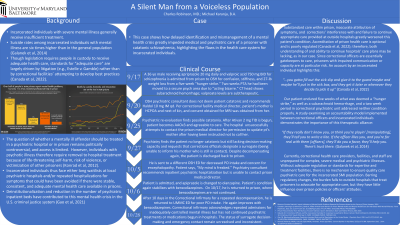Diversity, Equity, and Inclusion
Session: Poster Session
(072) A Silent Man from a Voiceless Population

Trainee Involvement: Yes

Michael Karanja, B.A.
Medical Student
University of Maryland School of Medicine
Arnold, Maryland, United States.jpg)
Charles Robinson, MD
Assistant Professor
University of Maryland Medical Center
Baltimore, Maryland, United States
Presenting Author(s)
Co-Author(s)
Background/Significance Treatment of incarcerated individuals with severe mental illness has often been noted to be insufficient. In our case, delayed identification and mismanagement of a mental health crisis impeded medical and psychiatric care of a prisoner. Case A 36 yo male with a history of catatonic schizophrenia was transferred to a community hospital from the secure psychiatric area of the prison after a 5-week “hunger strike,” 27- lb. weight loss, stiffness, and hallucinations. He was found to have a subarachnoid hemorrhage and to be catatonic. The patient was returned to the prison health care facility after resolution of his subarachnoid hemorrhage, then rehospitalized after a week of continued symptoms. Catatonic symptoms improved with benzodiazepines, but catatonia recurred after he was discharged back to prison, leading to six subsequent hospital admissions over the next three months. The prison medical director consulted an expert in catatonia, and both concluded that treatment of his severe mental illness had been inadequate ant that the patient was at risk of dying; however, correctional staff pursued a gastrostomy tube instead of the recommended ECT (electroconvulsive therapy). Following gastrostomy, the prison infirmary increased the patient’s lorazepam dose, and he again fell and was hospitalized with altered mental status, as well as proctitis. Despite these adverse events, the prison restarted the same medication regimen when he returned. Discussion Accreditation for prison health care is voluntary and not regulated in the same way hospitals and clinics are regulated in the community. This can produce variation in service delivery and quality of care as well as a lack of oversight on the use of best practices in medical and mental health, leading to potential ethical violations (Canada et al, 2022). Additionally, incarcerated individuals with mental illness are disproportionately housed in state prisons’ disciplinary segregation and supermax units (Galenek et al, 2014), increasing the risk of psychiatric decompensation. Correctional staff and administrators' policies and attitudes thus increase risk and restrict access to medical care. Our patient’s catatonia was treated as a “hunger strike.” The injury that led to his subarachnoid hemorrhage and may well have triggered this episode of catatonia apparently went altogether unnoticed. Furthermore, prison policies obstructed access to standard-of-care interventions such as ECT and appropriate medication trials, and they led to a questionably necessary procedure and its subsequent complications. Conclusion Substandard care within prison and limitations imposed on care at outside hospitals worsened this patient’s condition. Correctional administrators, health care providers, facilities, and staff are unprepared for complex, severe medical and psychiatric diseases. The nature of the correctional system makes it unfit to determine prisoners’ access to treatment. References Canada K, Barrenger S, Bohrman C, Banks A, Peketi P. Multi-Level Barriers to Prison Mental Health and Physical Health Care for Individuals With Mental Illnesses. Front Psychiatry. 2022 Jun 3;13:777124. doi: 10.3389/fpsyt.2022.777124. PMID: 35722588; PMCID: PMC9203858. Galanek JD. Correctional officers and the incarcerated mentally ill: responses to psychiatric illness in prison. Med Anthropol Q. 2015 Mar;29(1):116-36. doi: 10.1111/maq.12137. Epub 2014 Sep 15. PMID: 25219680; PMCID: PMC4351153.

